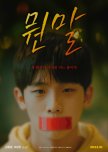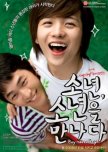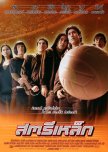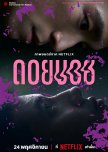
The transformative power of cinema to improve society
Taiwanese screenwriter, director and producer Angel I-Han Teng believes in the transformative power of cinema to improve society. In this way, he writes the script for 'Bao Bao' (親愛的卵男日記), an LGBT+ themed drama co-produced between Taiwan and the United Kingdom, which focuses on the struggles of same-sex couples to form families in that Asian island.Presented at Outfest, the Asia-Pacific Film Festival, in Los Angeles, United States, in 2018, and released in theaters in Taiwan and Japan that same year, the film, directed by Shie Guang Cheng, revolves around two homosexual couples: Joanne and Cindy, and Charles and Tim. The four young people live in London and plan to have children, but then they have to return to Taiwan, where challenges await them.
'Bao Bao' was written and made while Teng was residing in the United States, but it tells an exclusively Taiwanese story, but universal due to the impossibility of homosexual couples to adopt children and marry in countries where people of the same sex do not have the possibility of getting married.
For the filmmaker, the best result is to be able to make Taiwanese stories with Taiwanese actors and then let an international audience see and appreciate them.
Her training in Psychology allows the writer to develop complex characters in her work faced with complex dilemmas, such as homosexuality and the adoption of newborn children.
In her marriage to Joanne/Xu Jie An (Christine Ke), Cindy/Fang Rong Xin (Ries Emmie), is a young woman who is expecting two babies, but loses one. Having also lost trust in her partner, Cindy doesn't know where to go, who to believe, or whether it's her baby or not. So, he decides to return to Taiwan from London, where he has lived for some time. In her hometown, she will find care in Yang Tai / Ah Tai, (Yankee Yang), her childhood best friend, who promises to raise the baby with her.
Confused about what a family should be like, Cindy finally works up the courage to confront Joanne and the gay couple of Charles Watanabe/Du Bian Zhi Jiu (Yukihiko Kageyama) and Tim/Li Hao Ting (Daniel Tsai). At the time the film was filmed, equal marriage or homosexual marriage was not yet legalized in Taiwan. Even today, after this right has been legal since 2019, the existence of same-sex parents is still not acceptable for that society. And our protagonist trusts that that day will come.
With this, her first narrative feature film as a writer, the also sound specialist and with extensive experience working as a recording engineer and sound mixer, begins a filmography in which she addresses issues related to identity, gender, feminism and rights. humans with a subtle sensitivity, as can be seen in 'Rose Skirt' (玫瑰色的裙), 'The Fragrance of the First Flower', winner of the Gold Award for an investment fund at the GagaOOLala Pitching Sessions, or 'A Balloon's Landing'(我在這裡等你), 2024.
'Bao Bao', a film that allowed Angel I-Han Teng to obtain the Excellent Screenplay Award from the Taiwanese government, is also an example of his interest in the musicality of cinematographic components that go beyond the conventional limits between sound and music in cinema.
Teng's fascination with highlighting gender issues begins in his Family Psychology classes at the University: "Not only was I not familiar with same-sex parent households, but I noticed that all the examples the professor gave were from abroad. Those from Taiwan either didn't stand out or weren't seen. A creative light bulb went off in my head," he says. He adds: "I appreciate the beauty of individual differences although we share many similarities. The complexities of the human mind open my imagination to create works of art. I wrote many scripts and entered competitions, some of which completely changed the course of my career my life…".

Look for safe sex and a decent chat. Through a gay dating app, he has scheduled to meet Vince, the attractive and discreet neighbor, but the sexual encounter is interrupted by the unexpected arrival of his parents, and before them he will once again restrain his deepest but most difficult desire: "come out of the closet."
However, Dino cannot prevent the brand new dildo from being seen by his mother.
Vince is willing to wait. The wait is worth it: a friendly relationship begins to emerge between the two that may very well lead to something more.
With solid performances, a beautiful script, magnificent camera work and charming surroundings, the short film 'This Is Not A Coming Out Story' (2022), by Filipino filmmaker Mark Felix Ebreo, brings us fun moments and an irresistible visual chemistry of its two protagonists: Dino, played by AJ Sison, known for his role in 'U-Turn (2020)', 'Dito at doon' (2021) and 'Love in the Ungodly Hour' (2021) and Vince, a character assumed by Jel Tarun, actor known for his role in 'Silent Cries' (2023).
The short film also tells us about homophobia.
The soundtrack fits perfectly with the film story.
With a script by Mark Felix Ebreo himself, the cast closes with the performances of Jun Nayra, known for his performance in 'Bonifacio: Ang unang pangulo' (2014), 'Darna' (2022) and 'Sandwich' (2023), and Gigi Hernandez, known for her role in 'Sandwich' (2023), 'Ikigai: Life Is a Beautiful Ride' (2023) and 'Alapaap' (2022), playing Jerome and Liz, Dino's father and mother, respectively.
Committed to bringing queer narratives to spaces to increase the visibility of the stories of people who have not yet discovered their true identity, Mark Felix Ebreo won with this short film the Best Director award at the 1st Pelikulaya LGBTQIA+ International Film Festival, as well as a Honorable Mention in the Short Fiction category at the 34th CCP Gawad Alternatibo.
Additionally, 'This Is Not A Coming Out Story' won the Cardinal Gold Award with the highest honor, as well as the award for best screenplay at the 20th CineMapua International Student Film Festival.

How much and in what way will our own decisions and those of others affect us?
One of the most complex and uncomfortable topics in human relationships is infidelity, but our worst qualities, decisions and actions are a great tool for cinema, which can turn even the most twisted relationship into an emotional, deep, complex story. and explosive, which divides opinions and leads us to explore what we do not dare to see in ourselves.Infidelity is ugly and painful, and can be traumatic for many people, but it becomes interesting and arouses curiosity when it is a "tragedy of others", the kind that movies show us, and it is also a good way to learn about more about the subject, the reasons that lead us to betray our partner and the way we deal with all that.
'Spring Like a Lover', by director, screenwriter and editor Daisuke Shigaya, is a 2017 Japanese film that proposes an unusual love triangle between three homosexual men whose lives fatefully intertwine.
Kazu (Konosuke Furuya) distrusts her current boyfriend, Shin (Tact Igarashi), a moody photographer, because she believes he is unfaithful. After an argument, Kazu revisits her ex-boyfriend, Takashi (Kazuki Kawakami), but discovers that he is now married to a woman and is unaware that this man is the one Shin has been having sex with behind his back. After the reunion, Takashi rekindles his feelings for the person who once shared his bed.
In this story about sex, betrayal, obsession and toxic relationships, the lives of these three men become complicated after the infidelity of one of them towards his partner. Of course, no one deliberately wants to harm others, but that is exactly what they end up doing.
One night, Takashi tries to have sex with Kazu, but Kazu immediately rejects him, not wanting to be involved in a relationship with a married man, and returns to Shin's house.
In Kazu's absence, Shin goes out to the terrace where her boyfriend has a beautiful caged songbird and deliberately tries to make the bird fly out of the cage. When he doesn't succeed, he leaves the door open.
In this short film that explores the universality of human emotions and poses a question: How much and in what way will our own decisions and those of others affect us? When reality breaks through, this complicated love triangle leads to tears, confrontations , breakups and violence.
After returning home, Kazu and Shin's reunion allows them to reconcile and strengthen their relationship. However, Takashi has not been able to forget Kazu, so he confesses to his wife about his sexuality, and she breaks up with him, but not before accusing him of betrayal for not having been honest with her.
Kazu is the most empathetic character of the three. Because he cares about Shin, he is able to activate a protective instinct in him. She loves her boyfriend, so she will seek to prevent him from suffering the consequences of her own actions and decisions, even if the price is high. He has seen how the photographer is heading towards a precipice and since there is nothing he can do to stop him, he appears frustrated and helpless. The image in the bathtub is, in addition to being heartbreaking, symbolic in this sense.
Shin is not a good man who messes up and makes a mistake. Both the script and the film are responsible for emphasizing that she is deliberately unfaithful to her boyfriend, and this fact will unleash all the subsequent conflicts. In addition, he violates people's privacy by taking photos of them in the streets without their consent, so he has to flee when he is caught in the act, because although in Japan it is not a criminal offense to photograph people's faces in public, it can be a crime. a civil offense if the person who has been photographed finds or fears that their image may be published anywhere.
On the other hand, Shin shows a cruel and violent face, not only for hitting Takashi, but for retaliating against Kazu in the bird for abandoning him and leaving the house. Even so, the strong emotional control she has over her boyfriend is evident.
Between arguments, crying, beatings, nude scenes and explicit sex, the 33-minute duration of the footage passes, which should not be analyzed, evaluated, labeled and classified as BL. There is a tendency among lovers of the so-called "Boys Love" to classify as such any love relationship between boys on the screen, and when they discover that the audiovisual shows a more complex dynamic, with characters with diverse nuances, circumstances and conflicts that surpass those of the genre of their preference, they accuse that this is not what they want to see, that they do not understand the film or television proposal, and they advise others not to see the artistic product, but not before giving low ratings on platforms where they are discussed. and analyze these dramatizations.
'Spring Like a Lover' is not a BL genre film, but an LGBT+ themed drama. The viewer should not expect to find here a tender and light romance between boys of those in which the audience is more interested in knowing the height of the step from which one of the protagonists will fall into the arms of the other to be happily ever after, in instead of living an experience closer to real life.
That is why 'Sprint Like a Lover' does not shy away from presenting damaged, broken, unfaithful, lying and miserable beings, as well as betrayal, infidelity, dysfunctional relationships, violence in the couple, breakups, pain. It does not shy away from showing romantic lives that are flawed and in complete anarchy.
If Shin's infidelity has an impact on the couple and on Takashi, the latter is the living reflection of human misery, selfishness, hypocrisy and limitless cruelty in demanding sex from Kazu in exchange for Shin's freedom, in addition to accept money from Kazu to drop the charges against her boyfriend.
The three men carry the entire weight of the film, without ignoring the brief presence of Takashi's wife, and are capable of transmitting emotions with gestures, silences, screams and looks in a performance as subtle as it is extraordinary, closing an intense, heartbreaking film. and very emotional.
The ending does not surprise fans of dramas that explore relationships with all their contradictions, conflicts and realities. Shin's infidelity causes his own ruin and that of the other two men.
"No one is an island, complete in himself," the poet John Donne wrote centuries ago. That is why Shin's actions influence both his own life and that of the other two characters, and end up affecting them directly. By being forced to assume the consequences of their own decisions and those of others, they see their worlds destabilized and condemned to a spiral of many other equally erroneous and destabilizing acts and decisions.
It is then that the viewer can understand the message of the film: the importance of becoming aware that every decision we make and every act we perform has natural and social consequences. We are all responsible for every decision we make and every act we perform, in such a way that we can say that our life is the result of our choices and not of circumstances. While it is true that circumstances influence our reality in life, it is also important to accept the fact that what is truly determining is the way in which we choose to react to each situation that is presented to us.
Perhaps somewhat underrated at the time, with the passage of time it has gained public understanding, but it must be seen because Daisuke Shigaya knew what he was doing with this film of rebellious and explosive emotions. We are rational beings, which adds one more element to the mere instinctive aspect that characterizes us. The fact of being rational beings implies that we can choose the way we react to the different circumstances in life, hence the statement that our life is the result of our decisions, not the circumstances.
Observation: MDL and other platforms make a mistake by labeling Tact Igarashi as Kazu. The character of Kazu is played by Konosuke Furuya, while Tact Igarashi plays Shinji Matsumoto or simply Shin, Kazu's photographer boyfriend. The character of Takashi is played by actor Kazuki Kawakami.
The director, screenwriter and editor of the film is Daisuke Shigaya.
Please, if someone could help verify and correct the error I would appreciate it. Thank you.

A one-sided love of a boy for a boy
Dong Young (Kim Dong Young) has been secretly in love with Jung Min (Lee Jung Min), his best friend, since he met him 10 years ago, and he has come up with an idea to finally declare his love.Romantic dramas, no matter how short in duration, achieve immortality when in a single scene they manage to convey the spirit of the central bond.
'What To Say' (뭔말 Mwonmal), by South Korean filmmaker Kang I Deun, has a sequence of overwhelming subtlety, in which we witness how a young man assures his best friend that he will make a film, and to the astonishment of This will reveal the scenario written in the script to be captured in moving images, which is none other than the same story of the friendly relationship that has existed between the two friends and how the main protagonist of the film to be produced would like to carry that bond on another level, even knowing that it is "a cliché story where Woo Joo's first love (the name he gives himself in the future film) ends unsuccessfully."
With a precise, contained and melancholic narrative, Dong Young will know the answer, which will leave him devastated by heartbreak.
I am not issuing a spoiler: the same trailer for the short film on the AYDENSTORY channel assumes that we are in the presence of a unilateral love of a boy for a boy, and how this secret love follows them until one declares, with subtlety, naivety and creativity, their feelings for the other.
That statement highlights the purest love that Dong Young feels for this man who will never want (or be able) to live up to such a naive and immaculate confession.
The main reason why I recommend the film and give it a perfect score is that the director conceived flesh and blood, complex and human characters, who go beyond stereotypes. In this way, the young man who resorts to fantastic narrative to declare his feelings is not superficial by any means: he is simply a man who fell in love with another man. Following this line, the character played by Kim Dong Young is endearing because he has finally had the courage to take that step that has cost him a large part of his existence, although this presupposes the risk of not only losing the love of his life but also to the childhood friend.
The director himself has stated that the objective of the film is to expose "the long hesitations and great worries, brief confessions and small consolations. I hope that all the universes of this world are happy."

An unusual love triangle
Sukitomo (I Like Tomo – スキトモ), the LGBT+-themed romantic drama and shounen-ai film by Japanese filmmaker Mitshuhiro Mihara, portrays that confusing time of youth in which relationships become imprecise and the balance between love becomes precarious. , friendship and family are broken.The film, from 2007, proposes an unusual love triangle between the serious and responsible young man Aoi Tomokazu, a member of a boxing team and who is in his third year of university, Yoshiko Saitō, his best friend and two years younger, whom he sees as a little brother - although he feels something more for him than a simple friendship - and Tomokazu's sister, Aoi Misao (Komatsu Airi), who is also romantically attracted to Tomokazu and is jealous of his relationship with Yoshiki.
After his performance in 'Boys Love', of the same film genre, Takumi Saitō, star of the 'Prince of Tennis' musicals, now in the role of Aoi Tomokazu, continues in this film challenging perceptions of love, friendship and the sexuality. As in 'Boys Love', Saito acts alongside Aiba Hiroki, one of the co-stars of 'Prince of Tennis', the latter playing Yoshiko Saitō.
Released on January 13, 2007, the film was screened for the first time at the 16th Rainbow Reel Tokyo, an LGBT-themed film festival held annually in the Japanese capital, 'Sukimoto' tells us the evolution of relationship, from childhood to early youth, between the future boxer and the boy Yoshiki, who was hit by a truck while playing with Tomokazu and suffered an injury to his right leg.
This injury never fully heals and consequently he limps when he walks, a fact for which he believes Tomokazu feels guilty and treats him well for it. Yoshiki must deal not only with Misao's attempts to keep him away from his brother, but also with his own conflicting feelings.
The role played by Takumi Saitō is coherent in embodying the role of the young man so busy in boxing that he has not realized the attraction that Yoshiki and Misao feel towards him. I like his performance in this movie. I've seen some of his other work, but I really admire his art after watching 'Sukimoto'.
Hiroki Aiba also achieves naturalness playing the disabled friend in love with his best friend and neighbor, and Airi Komatsu as the 14-year-old sister who is jealous of her brother's relationship with Yoshiki, since she also has loving feelings for him.
Also convincing is the performance of Mizuki Tsuruoka in the role of Arisa Andō, Misao's best friend, who, despite her young age, has been able to understand not only Misao's loving attraction towards her brother, something she considers unhealthy, but also Yoshiki's love for Tomokazu.
The title of the film, which addresses themes such as friendship, love, family and fraternal relationships, is a play on words; «suki» (スキ), which translated from the Japanese language means "to like", and «tomo» (トモ), which refers to the name of the main character. Therefore, the name of the work could be literally translated as "I like Tomo."
With the production of Kawashiro Kazumi and Kataoka Masahiro, the director called on the award-winning Japanese photographer and director of photography Ashizawa Akiko to translate the script written by Kanasugi Hiroko into images.

A film that contributes to the fight for LGTBIQ+ rights
Over the last 15 years, LGTBIQ+ rights have made a significant leap and we owe a small part of it to cinema and television, increasingly committed to representing more and better gay, lesbian, bisexual, trans people. or non-binary identities. Although this drastic advance (at least, in the audiovisual field) is undoubtedly worth celebrating, it should not make us forget the struggles and sufferings of so many generations that preceded us.After this preamble, let's get into the matter:
If love is complicated between two people, imagine what it must be like when there are three of them. Imagine also when homophobia, internalized homophobia, harassment and forced coming out of the closet are added to the love triangle.
We have all this in equal parts in Rebel Heart, the 2023 Thai short film, youth romantic genre and LGBTIQ+ theme, written and directed by Zee, which also addresses themes such as love, friendship, personal growth, honesty and the trust.
It strikes me that the three main characters have their names in English and not the typical Thai names that seem very curious because they are strange or out of the ordinary to the Western viewer.
The film, from Iamzee Studios, begins when Lucas, the main character, breaks the fourth wall and comes into direct contact with the audience, looking and speaking directly to the camera, to introduce us to the story. From that moment on, the play hooks us and we feel part of an emotional roller coaster, a challenging journey in which we will find connection and meaning with the two young protagonists: Ben, played by Burdy, and Lucas, played by Bug, while They navigate the ups and downs of their relationship. Throughout the 25 minutes of footage, the characters explore different challenges and emotions.
Lucas has secretly loved Ben for three years, but he has not dared to express his feelings, because he considers that his best friend is heterosexual, in addition to fearing breaking the bond between them. They are both university students and have known each other since the first days of entering university. And now, in the last year of their studies, they will end the beginning of an adventure that will determine their destinies.
At first glance it seems like a very common story, but the dynamic between the two friends changes when Emma (Ami) appears, a college student girl who frequently surrounds Ben with attention, causing internal conflicts between the three young people, such as jealousy, pain and drama, especially in Lucas's character, when he discovers that Ben and Emma are in a relationship. Then external conflicts will arise, which I will explain later.
But this will not be a love triangle motivated as a way to escape, give life to a dying relationship, discover something new, take risks and get out of the comfort zone or other reasons that we have seen previously. Here an element rarely used in BL is introduced that will mark the relationship of three people now: internalized homophobia. However, like any love triangle, it will teach us something important.
At one point, we will discover that Emma, motivated by homophobia, has hired a bully, played by Pomp, to harass and beat Lucas, since she has understood his interest in Ben and suspects the closeness of the two young people. Realizing this, Ben breaks up with Emma and blocks her on the internet.
And it is here that the viewer discovers that Ben was the first to fall in love with Lucas and if they have been friends and shared a bedroom and time together it is because he has encouraged it by approaching Lucas from the first moment. I mean, Ben is not straight. Ben is not bisexual. Ben is a gay boy, a victim of internalized homophobia who chooses to hide his homosexuality by getting involved in romantic relationships with girls. In this way, the viewer can explain why Ben distances himself from Lucas and is dating Emma.
Upon discovering that Emma has planned to harm Lucas, Ben finally accepts himself and, in return, admits his love for the boy with whom he has also been in love for more than three years. It is then that, in addition to facing Emma's betrayal between them, they are ready for a life together, but not before seeking parental approval, something very common in heteronormative and patriarchal societies.
And it is here that the external conflict that the couple experiences is incorporated into the film: the rejection of their son's homosexual relationship by Lucas's father. Thanks to the intervention of the mother (Ajarn Jiab), in charge of pointing out the truth, she made the father realize what is important. With a strong message about how we could act in similar situations, out of love for his son, Mr. Evans overcomes his prejudices and ends up accepting the two children, first as lovers and then as his own children.
Likewise, we will learn that the reason for the father's rejection of his son's homosexuality is motivated by his personal experience, having had a suicidal brother who fought against the pain and suffering of also being a gay person, and how this experience could be reflected in the life of his own son and not wanting him to suffer the same fate as his brother.
While the way Ben breaks up with Emma is wrong, the way Emma outing Lucas to her father is disgusting and totally despicable. I can't explain how he came to receive the loving images of the two boys on his phone (this must have been what the father saw, since it is not shown and is not necessary for its full understanding by the viewer) but rather as an act of retaliation against Ben by Emma.
The film, while I was watching it, made me feel that it had an autobiographical nature. Perhaps the director lived a similar story firsthand, or learned about it from third parties, and captured it in images.
Despite the low budget, a cast made up of amateur actors, a weak script and a short plot, poorly developed characters and events, which affects the general quality of the product, it is surprising for having a Thai-American technical and acting team, the integration of an interracial marriage, the use of Thai and English languages, all unusual in BL productions from this Southeast Asian country, and above all for contributing to equality, visibility, acceptance, recognition and, more importantly, the legality of LGBT+ people, in a nation that still does not recognize same-sex marriage. Also, because the short film addresses the topic outside of stereotypes, caricatures or exaggerated dramas. For this alone the short is worth watching.

First step in a career in favor of LGBT people
'Boy Meets Boy' is a South Korean short film of romantic, musical, youth and LGBT+ themes, premiered at the 13th Pusan International Film Festival in 2008, and since then it has given a lot to talk about for several reasons: it was the first film work by Kim Jho Kwang-soo, the first collaboration between this filmmaker and the screenwriter Min Yong Keun, and presented for the first time Min Soo and Seok Yi, two characters that he would return to the following year to form the wedding couple of the short 'Just Friend?', also following up Min Soo in Love 100°, another short of his authorship, from 2010.Since then, the South Korean filmmaker showed signs of taking his time to weave the story with the thoroughness that has always characterized him, working like a craftsman in his eagerness to recreate every detail.
The director of 'The New Employee: The Movie' (2023) has spent almost two decades building an authorial block of unusual quality in the history of South Korean cinema, full of triumphs and very few mistakes. Throughout his work he has not only made important films, series and short films, but through them he has known how to rewrite the history of his country anchored to its most recurrent film themes and objectives: such as sexual awakening, most of age, sexuality, gender identity, being queer in a heteronormative and discriminatory society towards LGBT+ people and activism in favor of the rights of this group to which he himself has acknowledged belonging since 2006.
To film the short, he based it on Min Yong Keun's script of the same name about a love crush, in a festive and magical way. The film, without spoken dialogue, describes the relationship between Min Soo (Kim Hye Sung), a boy who loves photography and is gay, and Seok-Yi (Lee Hyun-jin), who seems a little tough but still manages groom to show your soft side. It also tells us about the indecision when it comes to expressing feelings and the need to be brave and go in search of love when it has arrived at your door.
Despite its short duration and the incorporation of music, dance and a magical fantasy, the viewer manages to maintain the common thread of the story in that elegant background of love at first sight.
At one point in the film, Kim Jho Kwang-soo, wang-soo, who collaborated with director Lee Song Hee Il to produce 2006's 'No Regret,' considered "the first real Korean gay film," and has shot others gay-themed works such as 'Two Weddings and a Funeral' (2012), 'One Night Only' (2014) or 'Made on the Rooftop', and the BL series 'The New Employee', introduces a fantastic character in the form of a fairy which comes to represent Min Soo's thoughts as someone who falls in love for the first time.
Despite not having dialogues, the filmmaker manages to make the audience identify with his characters, in addition to clearly establishing the relationships between them, through looks, gestures, expressions, body language and useful inclusion of the fairy (Yeh Ji-won).
The fairy symbolically represents the thoughts and feelings of the boy who has just discovered love for the first time in his short life: the nascent passion, the sexual awakening, the discovery, the acceptance, the insecurities, the fears, the worries, the fears, excitement, enthusiasm, innocence, naivety, and expectation, all in a mixture that explodes in unison.
With a palette of bright, festive colors, and corny and strident music to identify the fairy, but restrained and romantic to enhance the mood of the characters and set the tone of the film, the director guides us towards the discovery of love and sexuality in a new and unique experience for the character.
Of an autobiographical nature, the director himself stated that he based the story told in 'Boy Meets Boy' on his first love experience.
I liked the chemistry of the two protagonists, palpable from their first meeting on the bus. They are both adorably acting actors whose performances are enough to recommend watching the film.
Also highlight the use of Min Su's film reel as a symbol of love and life, by first representing the union of the two protagonist boys, and then serving as an invisible and conductive thread that, in constant movement, like life itself, unites all the characters.

A tribute to a pioneering figure in Taiwan's LGBTQ+ community
When they go to visit Mickey, their terminally ill former English teacher, two men and a woman remember their youth, when they began their friendship during their high school years.After saying goodbye to the sick man, they return to the old intensive school to remember their years of study and their rebellious youth. Suddenly, quickly, colorfully and festively, the story goes back in time, to 1994.
At this point in the footage we have been identifying the main characters of the Taiwanese youth romantic drama 'After School', from 2023, by director and screenwriter Blue Lan, about coming of age.
Cheng Heng, the main narrator, is a teenager and only child who aspires to be a filmmaker, although his father insists that he study mathematics to become a teacher. Enrolled in Success Cram School, he takes remedial lessons to help improve his grades. However, instead of paying attention to his studies, he spends most of the day interrupting lessons and playing pranks, such as calling the school secretary, using his voice to make sexual advances, or setting fire to the school and provoking a fire with the consequent evacuation of students, teachers and administrators.
Cheng Hsiang is Cheng Heng's friend and also a troublemaker. He is the typical cute boy in the class, and many of his classmates dream of being his boyfriend, with the exception of the class beauty, Chen Sih, whom Cheng Heng has a crush on.
In addition to games and studies, the two boys share a bed in Cheng Heng's house, since his parents have taken him in, knowing of his poverty. They practically do everything together, from sharing a toothbrush to joking about their dirty, semen-stained underwear.
Ho Shang, an obedient and rule-abiding student, is the third in the company, known as the three musketeers of success, although not always of his own free will. Son of Wang, the director of the intensive school, is dragged by the two best friends in their misdeeds. We will soon learn the reason: when the exasperated principal wants to expel Cheng Heng and Cheng Hsiang, his wife will remind him how Ho Shang, in elementary school, was bullied by the older students, and the duo always protected him.
As we anticipated, Cheng Heng believes that studying at school will allow her to be close to Chen Sih, a girl with a strong character who defends herself. However, Cheng Heng is too nervous to ask her out.
With a main arc in the usual teen romantic comedy style, we follow the friends in their teenage pranks, falling in love and family relationships, used mainly for laughs, in an approach that takes up most of the film's 124-minute running time. .
Based on true events, when Mickey, a new substitute teacher with progressive ideas about teaching and society in general, takes over the classroom, the two young people discover a mentor who finally offers them proper guidance about their lives, by talking to them about romantic relationships and sexuality and teaching them to understand homosexuals and themselves.
Mickey openly addresses issues of sexuality education in the classroom and beyond, and encourages his students to think freely. Upon learning that he also dreams of being a filmmaker, Cheng Heng will admire the professor even more and will have him as a role model, interested in adopting his rich philosophy of life.
An embarrassing home accident causes Cheng Heng to suffer a burn in his groin. This will be the reason why students begin to speculate that Cheng Heng and Cheng Hsiang may have a romantic relationship.
However, this same event will also serve as a pretext for Mickey, aware of the rumors, to offer advice and guidance to a student who is currently going through a period of doubts and insecurities regarding his sexuality.
Meanwhile, Chen Sih begins dating the trio, Ho Shang fights with his parents over his two friends, Cheng Hsiang experiences a homosensual awakening, and Cheng Heng becomes more open to sexuality under Mickey's positive influence.
Michael's appearance permeates an atmosphere of freedom and fun. In truth, his dream is other than working as a teacher. The "awakening" he will generate in the students, in completely different directions, that eventually occurs due to his influence, takes the narrative down a completely new path. The story unfolds in a surprising way, this being one of the best aspects of the entire film, which should definitely be attributed to the way Blue Lan handles the twists.
At this point, the comedy transforms into drama, which reaches greater intensity as the story progresses, to the point that the last part, which also returns to the opening scene, borders on the melodramatic. Although this last aspect does not always work well, the truth is that 'After School' never abandons its intention to entertain.
At this point, multiple LGBTQ+ characters and stories are introduced into the story. The film puts homosexuality in the spotlight. However, despite exploring many relevant topics with the goal of educating and raising awareness among viewers, the stories barely scratch the surface instead of highlighting complex experiences. On the other hand, for the moment they perpetuate superficial stereotypes.
There is an excessive abuse of melodramatic scenes, especially when Cheng Heng's parents catch their son watching a gay porn video (which causes the incident noted above) and then catch him in a pose that suggests he is kissing his friend, for example. which his parents overreact while crying, lashing out at the two boys, condemning their son and expelling Cheng Hsiang from the house where they took him in.
The director, Blue Lan, seems well-intentioned. He dedicates his autobiographical film to Mickey Chen, his real-life mentor, an esteemed figure and pioneer in Taiwan's LGBTQ+ community. 'After School' pays tribute to someone who was instrumental in producing documentaries focused on queer and gender issues, actively participating in street protests advocating for equal rights for gays and lesbians.
Kipo Lin's editing results in a fast and fairly adequate narrative, although the extensive flashbacks to scenes already presented could have been avoided.
Comments on LGBT rights in the country of the time are quite frequent, without ignoring the simplicity of the messages and not describing gay issues with sufficient nuances. Even so, they address problems such as the pressure that adolescents felt in the 90s of the last century from their parents (they still suffer today) to succeed on the "correct" path, that is, the heterosexual one, the heteronormative, interpreted as studying in a good school, being able to enroll in the best university, getting an excellent job after graduating and getting married and having a magnificent family, especially with many children.
In that conservative and heteronormative society, concepts like homosexuality definitely have no place. Much less homosexual marriage, recognized only in the country 25 years after the events narrated in the film.
This approach adds depth to the story and reinforces the film's positive intentions, although the overall attitude here remains "light" to the point of becoming idyllic at times. In general, Blue Lan does not significantly lose its sense of measure.
The performances fit perfectly with the narrative style of the story. While the character played by Zhan Huai Yun exhibits impressive chemistry with Chiu Yi Tai's Cheng Hsiang, who is equally good, also in the way he handles his coming of age, even though the former's role is reduced to that of best friend.
Charlize Lamb as Chen Sih provides the necessary female element in the story as a bone of contention who eventually shapes the lives of the young people as well, in another quite attractive presence in the film.
Blue Lan himself plays Cheng Heng quite convincingly, both in the humorous and dramatic moments.
While Hou Yan Xi as Mickey is excellent in the role of the progressive teacher/mentor, Chien He Wu as Ho Shang promises a meatier journey, stealing the show at times, particularly after his transformation, when he finally spreads his wings. and he dares to fly without caring about his father's prejudices, but there is not enough development of his character and his conflicts.
On the other hand, the convincing bromance between Cheng Heng and Cheng Hsiang delves into romantic territory when they share a moment of intimacy, but the result does not meet the audience's expectations, failing to delve into feelings or portray the romantic nuances of the relationship. Despite addressing LGBT+ themes, the film avoids telling a homosexual love story. The cinematography follows brilliant paths, in an approach that coherently adapts to the narrative.
'After School' lacks a good script. Its poor writing reiterates all the predictable tropes. Sentimental messages fail to strike the viewer's nerve. We have seen this film about rebellious young people and mentors who guide their students on other occasions with better results.
The film highlights the importance of finding a mentor in life, a guide and educator that young people can look up to.
Mickey's arrival in the classrooms also eventually moves in the same direction of providing moments of reflection, but also of fun, adding to the narrative of the film, but the "awakening" of the young people, in completely different directions, which eventually occurs With the teacher's help, he takes the narrative down a completely new path. Frankly, the way the story unfolds is as surprising as it gets, in one of the best aspects of the entire movie, which should definitely be attributed to the way Blue Lan handles the twists.
Despite being cliched and cheesy at times, 'After School' is still a very entertaining film that manages to present its commentary eloquently, although its greatest feature comes from the fact that it will repeatedly leave the viewer with a smile on their face.

Two soulmates condemned to suffering and oblivion
Imagine that you are completely happy with your partner, that you have built a common past with all the patience and complicity imaginable. Imagine that the myth of the better half has come true, the Japanese legend that assures us that there is someone linked to us by a red thread. Imagine that you finally found someone who was born to complement you.Imagine that he is the only person on the planet who will understand you like no one has ever understood you, with whom you will merge in a love as deep as it is unimaginable. Imagine that you cannot conceive of a future apart, with a fence only between your house and that of the boy you have loved since adolescence, plans made, mutual friends. All perfect. However, one day a sad family secret that they both are unaware of catches up with them and turns everything upside down. Imagine that two soul mates are condemned to suffering and oblivion.
This is the premise of Regal Entertainment Inc.'s 2020 Filipino boy love (BL) romantic drama 'Ben .
Set in a period marked by the pandemic caused by Covid-19, the series follows the story of neighbors and childhood friends Ben and Jim, who lose contact after Jim moves to another city with his father after her mother's death.
Today, after 8 years, due to the restrictions generated by the new coronavirus, Jim will return to spend quarantine with his grandmother, Elma Magtibay (Christina Simon). In this way, friends reconnect and restart their friendship where they left off.
When two soul mates meet or are reunited, as is the case, a whirlwind of emotions and experiences are generated that serve as a sign of the undeniable connection that exists between them.
During that time, they had both lost contact and it is through his best friend, Flo (Kat Galang), that Ben realizes that Jim is a popular young man on social media. As the two friends reconnect their lives, Ben, the dumb boy who is insecure about himself and life, but more open about his sexuality, reveals to Jim that he is gay.
Jim, the sincere young man with the warm smile, is surprised at first. The strange discomfort between the two is evident. But soon Jim reacts and reassures him: "I'll support you in whatever makes you happy. I'll be there, like a friend."
But what Jim doesn't know is that Ben has been in love with him since his teenage years, and wants to be more than just "best friends."
The first season, told from Ben's point of view, begins with this young man narrating, euphorically, how Jim's return can mean that the two friends restart their friendship at the same point where they left it 8 years ago. From his prism, the series is dedicated to exploring how the relationship blossomed and how it withered.
Just as Ben and Jim begin to enjoy their courtship, the former's mother tells him a secret about his father that could affect Jim's confidence if he knew the truth. At the same time, her abusive ex-boyfriend also returns. Ben decides to break up with Jim without giving him any reason almost at the same time that Jim publicly confesses his love for Ben.
In histrionic terms, not everything is hunky-dory. The group of the most notable performers of the series is joined by Sarah Edwards in the role of Yana, Jim's girlfriend, with a performance lacking depth, and Ben's ex-boyfriend, Leo Portugués, is assumed from the most complete physical extremity. by Johannes Rissler.
Sticking to the rules of romantic drama, we have in 'BXJ' the character archetypes one can expect: the supportive best friend, Flo, and the respective third parties, Yana and Olan (Ronald Martin Angeles), the courier service boy. Their characterizations seem like stuffy formulas that fail to add interesting layers to the main story. The latter two fill the sad "broken people meet" role, and even with her own love life in the second season, Flo ends up stuck in the role of Ben and Jim's third wheel.
Starting from these central characters and situations, without deviating too much from the protagonists, the plot fully complies with some of the canonical rules of television melodrama, and is filled with secrets from the past, violent ex-boyfriends who return, the admirer, health mentality, the family history, the tumultuous relationship between father and son, jealousy, revenge, a layer of machismo and misogyny that in this case barely reaches the thickness of other Filipino series, in addition to other dominant elements, such as the relationship crisis, the fidelity, commitment, uncertainty, the emergence of the most devastating routine, couple experiments, and the challenges that come with being queer in today's world.
It validates the cinematographic staging with insistent and expressive camera movements and intelligent use of scenery and locations.
At this point, I must express my discomfort about the convenience with which Jim confesses his love for Ben in the sense that he goes from being a young heterosexual to being homosexual in an unconvincing and overly convenient way.
Easy Ferrer, director and screenwriter of the series, doesn't even try to put his narrative hero through that harrowing process of discovery and acceptance in slow-burn mode. This "transition" occurs too quickly, as something spontaneous and lacking in organicity.
Nor is it convincing that two such close friends would lose touch in this era of social media. After all, Jim was Ben's first love. How is it possible that they didn't exchange phones or follow each other in the digital world?
On the other hand, the way Ben literally forces Jim to fall in love with him is forced.
Ben's character is presented as someone who simply uses Jim for his own convenience. Ben knows his friend is straight, so making him feel bad about his sexuality is wrong. And similarly, it very conveniently turns out that Jim breaks up with his girlfriend.
The character played by Jerome Ponce can be a little inconsistent at times, especially when it comes to his feelings and emotions: Jim only treats Ben as his best friend, but there are many times where Jim's actions and words towards Ben hint the possibility of something more, such as calling him "wife", the furtive glances he periodically lavishes on him, saying that he will protect him or wanting to hug him and wanting to sleep next to him frequently.
The series revolves on the basis of friends to lovers. However, the story tends to become overly complicated or vary in intensity at times when we lose focus on the main characters. The narrative begins to lose cohesion in the first season due to the incorporation of new characters and conflicts, and the viewer loses sight of the main plot.
This situation is not resolved in the second season. Quite the contrary, it is exacerbated, with the introduction of even more secondary characters and subplots that contribute little or nothing to the main story.
With underdeveloped events, plots, and characters, some stories are also messy or inorganic.

Delicacy and subtlety to, from black humor, address taboo topics: transsexuality, violence and death
Just hearing the premise makes one curious. Action films abound, but there can't be too many like 'Man of High Heels,' a moody, moving and violent Korean cop-gangster film written and directed by Jang Jin.Released in 2014, this South Korean noir film stars Cha Seung Won, who plays a homicide detective who hides a big secret.
Nicknamed Cyborg due to the metal plates on his arms and legs and his ability to make an arrest using only his formidable martial arts skills, even criminals are amazed by his toughness and physical prowess: gangster gang leader Heo -Bol (Song Young-Chang), was singing praises to Yoon Ji-Wook moments before the man appeared to beat him and his henchmen.
Skilled in hand-to-hand combat, Yoon Ji Wook is a tough homicide detective known for his ability to catch violent criminals using his own harsh methods. Revered as a legend among police officers, he is simultaneously feared among the mafia for his brutality in cracking down on crime.
However, beneath that macho and unscrupulous hard man appearance lies a secret that no one can know since the society in which he lives would not view him favorably: apparently the epitome of masculinity, Yoon Ji Wook feels that She is a woman in a man's body.
As much as she tries to suppress this inner desire, she can't fight what she really is: Yoon identifies as transgender.
The film is an intricate film noir story, and woven into the mask of the crime plot is the story of Yoon's decision to live his true life.
Upon finally reaching the point where he resolves to be a woman and decides to take the step of undergoing a sex reassignment operation and thus be able to see his teenage dream come true, he requests discharge from the police force.
This is when the turning point in the film occurs. Before having the opportunity to enter the operating room, unexpected situations begin to happen that interfere with their plans. His numerous enemies think his career change is also a perfect opportunity to take revenge. When some of his close friends are murdered and Jang-mi (Esom), a girl whose brother Yoon loved at school, is kidnapped, he realizes that he can't stand by and follow his dream any longer. How much will revenge cost him?
The members of a gang who had to go through bad times due to the actions of our narrative hero will come for him. Recognizing that it would be difficult for them to take revenge directly, they decide to endanger not only their dream but the people they love.
It is striking that in the history of cinema there has never been a film that deals with the issue of transgenderism in the way that 'Man of High Heels' does. Jang argued that he was inspired to write the script by friends who had encountered prejudice due to their sexual identities, and one of them had been forced to leave the police institution for being gay.
Furthermore, its subversion of classic action movie tropes typifies the irreverent approach of its director, who has built his reputation satirizing Korean society and mischievously modifying cinematic traditions.
With great delicacy and subtlety, the director addresses a topic that is widely carried and brought up by many people who are still full of prejudices who are not careful when it comes to pointing the finger at everything they do not know or do not understand.
'Man of High Heels' manages, with great elegance and good taste, to reflect transsexuality on the screen, and not only in an illustrative way but with a message to all those who dare to judge people who suffer this desire in their flesh.
On the one hand, the protagonist nails his role like very few other actors could have done. Cha Seung Won exudes masculinity from every pore. That is why it surprises many to see him dressed as a woman.
Reading comments from MDL users, one can notice the large number of people who are surprised to learn the premise of the film, and there are those who attack it because "I don't like it" and "I don't understand" or they simply attack it because they consider the way in which transsexuality is approached is crude.
The film is not only about seeing one of Korea's most mature actors transvestite, but also that 'Man of High Heels' debunks the idea, especially in the West, that South Korean cinema goes to the saga of what is produced in the rest of the world. Due to its story, its originality, its staging and, above all, its ability to surprise the viewer, Jang's film speaks for itself about the quality of the cinema of that Asian nation.
This is a film that will keep the most demanding viewer of the action genre in suspense, but seeks other audiences by incorporating the LGBT+ component. This is a violent film with a brutal staging loaded with scenes that will remain fixed in our retinas as a warm memory for life.
This film not only succeeds in the genre but stands out. The opening fight scene is a classic, beautifully choreographed with wit and crazy fun.
'Man of High Heels' begins with a bang that sets the stage for what is to come and introduces the protagonist whose presence is equally explosive and heartbreaking.
The film challenges our perception and reveals discrimination, love and acceptance, as well as tears in our hearts.
If someone believes that everything has been said, add that it is a different film in its history but that manages to combine all the ingredients and resources of an authentic Korean gangster film, with action scenes from the first to the last scene.
This is one of Cha's best performances, one that you can't help but get emotionally invested in.
But there's even more: this is a drama that will make your heart pound and make you feel restless in your seat and you will even want to help the tough homicide detective eliminate the gangsters without suffering a scratch, save his loved ones and until it makes it easier for you to get to the operating room on time.
This is a layered, multidimensional film about a real person, with a real career and reputation, real friends and colleagues.
This is a film that invites the transgender community to be smarter about accepting serious attempts to tell a nuanced transgender story.
'Man of High Heels' manages to dismantle all the concepts regarding what masculinity is supposed to be from the first sequence, without separating the humor from the action – sometimes crazy, but always precise.
A film full of messages and symbolism in every shot under masterful direction, a noir film emerges in all its expressions, an exquisite and suggestive black humor to address taboo topics such as transsexuality, violence and death itself, in a humorous way.

The struggle of LBGTQ+ people and the representation of stereotypes in Thai cinema (I)
'The Iron Ladies' ('Satree lek' - 2000) is a comedy-drama film written by Visuttchai Boonyakarnjawa and Jira Maligool.Based on the true story of a Thai men's volleyball team competing in the 1996 national championship with a squad made up primarily of gays and kathoey (transgender people), the award-winning film explores the struggles that are still present in the Thai LGBTQ+ community through through comedy, despite Thailand's international image as a country open to gay and transgender people.
In the greatest of storytelling traditions, Youngyooth Thongkonthun's debut feature is a true fairy tale with a happy ending, and marked a milestone in LGBTQ+ representation in the media, resonating recognition from international film festivals like the Festival Toronto Film International and several others.
Set in 1996, two gay amateur volleyball players, Chai (Jesdaporn Pholdee) and Mon (Sahaphap Tor) seek to participate in a championship despite being discriminated against.
Mon, who becomes the leader of the team, was a very talented player who constantly failed to be selected for various teams because he was gay. Chai, Mon's best friend, also experienced the same treatment but was always optimistic about things.
Their chance comes when Coach Bee is selected to form a winning team and she announces that the team will be open for everyone to try out. But when he selects Chai and Mon to be part of the team, some of the homophobic players quit in protest.
Bee then asks Mon to find some of his friends to join the team. They select Nong, a gay army sergeant; Pia, the transsexual star of a cabaret show; and Wit, whose parents don't know that their only son is gay.
Written by Strand Releasing. 'The Iron Ladies stars Jesdaporn Pholdee, Sahaphap Tor, Ekachai Buranapanit, Giorgio Maiocchi, Chaicharn Nimpulsawasdi, Kokkorn Benjathikoon and Anucha Chatkaew.
Cinematography was handled by Jira Maligool and editing by Sunij Asavinikul.
Most of them are gay and kathoey, except for one cishet (cisgender and straight) man who struggles to be accepted into the team. All of them must find their inner strengths and come together to face these challenges and participate in the national championship.
Through humor, Thongkonthun touches on sensitive topics that would otherwise have been difficult to cover at the end of the last century and the beginning of this one. It was then the era of depicting homosexuals and transgenders in the media under the old-fashioned cliché of the comic friend or villain, which even today persists on Thai television, but The Iron Ladies reveals the depth of these generally superficial characters.
Based on stereotypical representations of homosexuals (very flamboyant, feminine, happy, fearless), the film uses clichés that were common in the 2000s and are still prevalent today, and takes the stereotypes, gives them depth and appropriates them.
The film stands out for reflecting the struggle of LBGTQ+ people: while the team faces various challenges, each member of the team represents, through their own story, a societal problem that the community faces.
The cast does not fail to make their characters relatable and real within their banal and limited representation, as they mimic the tropes surrounding the representation of LGBTQ+ people in the early 2000s.
Through silly or quick comments, the film's dialogue skillfully addresses the struggles and hurtful comments prevalent in society towards LGBTQ+ people. Through absurd but witty scenes, the characters reflect and talk about love interests, being loved as a transgender person, buying items at a market, making friends, participating in sports, and being discriminated against. All this wrapped in a background of comedy and extravagant shots with vibrant electro music.
'The Iron Ladies' manages to generate controversy and reflection among (inter)national audiences about the representation and behavior towards the LGBTQ+ community.
However, the film is a predictable and over-the-top cliché in every way. Is it worth our attention? Absolutely yes, as it is a piece of history and contextualizing it will give you another view of the stereotypical image of Thailand. However, be aware of the large amount of hyper-shouting.
Note: The review of the sequel to 'The Iron Ladies' 2003 can be found, in MDL, on the page dedicated to this film on said platform.

The harsh reality of Thailand without makeup
This audiovisual product represents the harsh social, economic and political reality experienced by the Thai population. It talks about its problems and contexts, generally adverse, and becomes a reflection of that Asian country.The film shows topics such as illegal immigration for political, religious, ethnic or sexual orientation reasons; political, administrative and police corruption; police violence and crime, physical elimination of activists and members of the LGBT+ community, border militarization, dysfunctional families, bisexuality, racism, racial discrimination, politically motivated murders, homosexuality, economic problems, prostitution, political activism, stripper , violation of Human Rights, phenomena all reflections of Thai society. I highly doubt that for one reason or another any member of Thai society escapes seeing themselves reflected on the screen.
And facing all these problems there is Sorn (Ud Awat Ratanapintha), a Burmese refugee who, with the hope of a better life, seeks refuge and forges a new identity as a sex worker in Thailand. The protagonist will end up involved in a client's risky plan that endangers his life and that of other people. The diversity of conflicts he faces, his psychological complexity and emotional evolution, add layers to the narrative and weave an intriguing web that keeps the viewer in suspense during its hour and 36 minutes of duration.
The artistic maturity of its main performer protects a remarkable wisdom forged through the experiences lived on the film set. His ability to convey emotions, in a genuine way, cements his position as a leading actor in the Thai film and television scene. Far from seeking grandiloquence, you immerse yourself in your characters with the simplicity that characterizes those who understand that true art lies in authenticity.
From her first appearance on the big screen with the feature film 'Mary Is Happy, Mary Is Happy' (2013) or as a girl with dramas such as 'Hormones 1' (2013) and 'Hormones 2', in 2014, to her participation in television productions such as 'Cat Radio TV Season 1 and 2', '#HATETAG' (2021), 'Bad Genius' (2022), 'Quarantine Stories' (2020), of which in addition to being an actor he is the director and screenwriter; or in the 2022 documentary JMJ: Lesson 25, in which you participate as an actor and director, you have shown how versatile and capable you are of connecting with the public.
With 'Doi Boy' it is not the first time that he has faced the challenge of playing a leading character. Also in the drama ThirTEEN Terrors (2014), and the special Project S Let's Say Goodbye, from 2018, he had already been placed in front of the responsibility of leading plots. However, taking on the lead role in a film like this involved new challenges, and for the actor, it was a crucial step in his career.
Pae Arak Amornsupasiri as Ji, and Aelm Bhumibhat Thavornsiri, who plays Wuth, are the other two main characters.
The way in which social criticism, border problems and issues related to sexual orientation and male prostitution are represented in the film is not coincidental. In his first work, the documentary 'Boundary' (2013), its director, Nontawat Numbenchapol, already addressed the reality of the local population on the border between Thailand and Cambodia never before recognized in Thai cinematography.
Interested in social issues, in his second documentary, 'By The River', he visualized the situation of the villagers of Klity affected by lead water contamination. With this documentary, for the first time a film of that nationality won the Special Mention at the Locarno International Film Festival.
'Doi Boy' is not the first film with which the filmmaker analyzes issues related to sexual or gender identity. With the hybrid docu-fiction #BKKY, from 2016, this renowned documentary filmmaker and cinematographer visualizes stories of 100 teenagers interviewed in Bangkok about their loves, their dreams, and their coming of age just after graduating from high school. With it, he won the Jury Prize for best feature film at Lesbisch Schwule Filmtage Hamburg, Germany.
Despite a solid premise and good performances and general direction, the film does not reach perfection because it is based on an underdeveloped script, with aspects that deserved further exploration.
Beyond its positive aspects, Doi Boy can be perfected, like any artistic creation. The absence of unique characters like Sorn, Ji and Wuth and the practically non-existent presence of stories like this in Thai and Asian cinematography in general could work in its favor. However, these same positive qualities cause the film to be undervalued by followers of the BL genre, but as a thriller and drama it works well.
'Doi Boy' is a forceful justification to talk about Thailand far beyond the false and illusory representation, both in cinema, television and other national media, of a country as a sexual paradise and freedoms for members of the LGBT+ community and the rest of its population, equally discriminated against for political, ethnic and racial reasons. The film is a reflection of what hurts millions of human beings both in that nation and in the world. That is why I am grateful that it does not have a made-up ending and shows reality as it is until its ultimate consequences: those gray areas of the existence of the Thais shown in 'Doi Boy' are not really reflected in the BL dramas from that region of the planet.

A poorly “parked” relationship on the race track
Cinema and television, like all art that reflects the society in which they develop, have shown the trafficking of children through notable films, documentaries and television series. Numerous films and television programs expose this illegal practice and many of them are based and inspired by real-life cases.Asian dramas are committed to bringing all genres to the public, including those in which their protagonists have a romantic bond combined with supernatural powers.
Has the fact that Thailand is a point of origin, destination and transit of human trafficking aroused the interest of Nopachai Jayanama (Peter), as director, and Kanokphan Ornrattanasakul and Issaraporn Kuntisuk, as scriptwriters, to tell us in 'Pit Babe' a story that mixes homosexual romance, sport, intrigue, action, human trafficking, fantasy and supernatural powers?
This drama, an adaptation of the web novel by _alittlebitch, winks at Thai reality: the value of child victims of human trafficking does not lie in using them as sexual slaves, in forced labor or to extract their organs for commercialization, but in possessing special powers.
Are we facing a social drama of denunciation of human commerce? I would like this to be its purpose, but consistent with its BL condition, 'Pit Babe' will enhance the romance. This arises between Babe (Naret Promphaophan-Pavel), the king of the racetrack, and Charlie (Krittin Kitjaruwannakul-Pooh), his supporter.
Will the series have a hidden message? How many of Tony's “sons” among the superpowered children are gay men today? Babe, Charlie, Jeff, Kenta, Pete, Way...? That is, the main characters with powers who were raised-educated by the person dedicated to human trafficking ended up being homosexuals. Is there a hidden message in this, simple coincidence or something of “destiny”?
Babe is a very popular racing driver and admired by everyone. His achievements in the sport have led him to be considered number one. Among his followers is Charlie, a young man who wants to be a racing driver like him. However, he does not have the money or the contacts necessary to achieve it. Therefore, he looks for an opportunity to get closer to the leader of X Hunter. When he succeeds, he asks for your help and to lend him a car so he can materialize his aspirations. The only solution he can think of is to reach a strange agreement with Babe. Against logic, he agrees to help Charlie realize his dream.
On this journey, will Babe be able to win Charlie's heart? Will he lose the race he most wants to win this time? Will Charlie be the one interested in captivating the racing driver? Will the relationship that began as a game triumphantly cross the finish line to become a real romance?
The most notable thing about the series is its exciting scenes and the attractiveness of the actors.
There is a secondary couple, made up of Alan and Jeff.
The cast also includes Supanut Lourhaphanich (Nut), as Way; Obrnithi Leelavetchabutr (Ping), as Pete; Natthapong Pathong (Benz), as Kim; Asre Wattanayakul (Lee), as Dean; Hemmawich Khwanamphaiphan (Sailub), as Alan; Thanapon Aiemkumchai (Pon), as Jeff; Michael Kiettisak (Michael), as North; Pataraphol Wanlopsiri (Pop), as Winner; Pantach Kankham (Garfield), as Kenta; Supakorn Saokhor (TopTen), as Sonic; and Vorarit Vaijairanai (S), as Tony
The chemistry between the protagonists and the bed scenes fail to lift a series whose characters are unrealistic and undeveloped. Pavel and Pooh have charisma and are attractive, but the script does not help their relationship connect with the viewer.
I must clarify that it is not that I find being 'passive' degrading. It's not that I assume that, in a relationship between two men, there is a "superiority" on the part of the one who is 'active' compared to the other who is 'passive', but the abrupt change in Babe's personality seems inconceivable to me. . This transformation comes at the same time as the loss of his powers, at the hands of Charlie.
Babe abandons his well-crafted playboy image for years. In all his previous relationships he played the role of seme or asset. In the words of the BL series themselves, he was, of the two, “the one on top.” He began his relationship with Charle by assuming this role in bed. Suddenly, without a convincing explanation, Babe becomes Charlie's uke. Babe swaps to play the role of the “bottom.” So, you would have to ask yourself: Did the loss of his precious powers lead him to be the passive one in their relationship? Didn't this move cause a loss in his character's potential?
Despite being in front of the cameras practically all the time, the actor who plays Charlie fails to connect with me emotionally. They are not facilitating emotions, but hindering emotions that are transmitted to me by a character who fails to sensitize me. By not feeling or understanding Charlie's emotions and feelings, I cannot essentially grasp whether it is love or just sex that drives him. Only his acting stands out in the sex scenes. Note that I do not say “when making love.”
The transformation of the character played by Nut, already in the final moments, is not logical either. About an obvious thing, the incurable remorse that must have accompanied Way throughout much of his life for betraying Babe for years, causing the rift between him and the man he loves, as well as many, if not all, of the problems that have hit to the positive characters by being infiltrated into their ranks, Way's evolution from evil to purity, from darkness to light is narratively constructed, sustained by the effort to achieve the viewer's identification with the traitor. It is necessary to save it, the creators thought.
Way drinks with Pete because “he wants to make the situation better.” He doesn't know “what to do next.” He does not know if “what I have always believed is the right thing.” He asks Pete why he decided to leave Dad, and Pete tells him, “Because the truth is not what I thought… I decided to leave to end the vicious cycle that Dad had created.” And he tells her that she still has the chance to choose what she wants to do. Way has been asked to show the despondency caused by guilt. Way has had the option all his life to choose the right path, but he has decided to be by Tony's side, even knowing what this means. But suddenly, some words from Pete whispered in his ear between sips of liquor and a few pats on the back invite him to “do the right thing.” And this would not be a problem if they had gotten rid of the rampant schematism in the character design and the all-too-evident desire to redeem him.
A story that fails to convince, clumsily designed characters, characters lacking development and therefore generating empathy, limitations in the explanation of the characters' decision making, poverty in the development of events and irregularities regarding changes of personality, are several of the main characteristics of the drama.
Peter throws together a few tropes and too many clichés. With fewer ambitions and fewer plot holes, perhaps the series would have become a full-throttle, full-speed car swallowing up the race track.

The romantic comedy of two neighbors in conflict
Who doesn't like a romantic comedy, even knowing its dependence on many clichés and narrative schemes already seen? Raise your hand if you don't enjoy the kissing scenes in the rain, the happy endings, the music that surrounds the lovers at full volume, the typical corniness and such unrealistic situations, despite knowing in advance that they are sufficiently illusory. Who hasn't dreamed of a love story larger than life itself?Can you guarantee that you would reject your "prince charming" singing to you in front of the school and making a fool of yourself for you, and surprising you with a guitar (or drums) playing your favorite song? Who doesn't like to see a series of this genre capable of offering us a ray of hope, a good dose of faith in the healing power of love and the guarantee of a "happily ever after"?
'Monster Next Door' is the Thai romantic comedy series that frames a love story with university overtones, and that draws attention not only for its warmth and humor, but also for its ability to immerse the viewer in a narrative that combines relationship between neighbors, the value of friendship, family, love for pets and the unexpected turns of love.
Based on the novel "Godzilla Next Door" (พี่เขาบุกโลกของผม) by Jiwinil, 'Monster Next Door' tells the story of Diew, a reserved and introverted first-year college student who likes to live in his ultra world private, hiding in his apartment. His best friends are a turtle named Khun Shy and his classmate Game.
But what Diew didn't count on is that his dorm life would include his neighbor, God, an attractive, kind, and outgoing senior from another college, who with his sweet lips has just moved into the next room.
Night after night, God and his friends either keep him from going to bed at his usual time or drag him out of bed with their loud parties. However, when he begins to interact with his neighbor, who is separated by a wall the width of a cigarette paper, Diew's perfect and harmonious world is turned upside down. They both fall in love: they stumble upon the shyness and wonder of first love.
And while the meet-cute, that is, when the two characters meet by chance in an adorable way in the first scenes and that becomes the beginning of their love story, serendipity does not stop uniting them in cafes, libraries and other spaces of the university or in their respective bedrooms, although there is a wall in between and without one having seen the other's face.
The supporting roles, played by Krismon Thanawat Sutthijaroen, Kade Tanapon Hathaidachadusadee, Ole Thanakorn Sangwan, Proud Urucha Sirichaiwongsakul, Pik Supawit Vichitrananda, Mhing Thatsaphon Ruengkitrattanakun, among others, bring to the story a rich tapestry of characters that enrich the main plot. Through these characters, the series manages to convey its light humor, emotional drama and, ultimately, a feeling of satisfaction and warmth to the viewer.
When a comedy of this type starts you know that at most it will entertain you. Although that will not be enough guarantee for you to stay since at any moment something may arise that will make you get up from the couch, caring very little about the story they were trying to tell us. However, in 'Monster Next Door' there is a factor that makes you want to continue in front of the screen until the final closing; and that detail for which you spend minutes after minutes and jump from one chapter to the next is none other than seeing its two protagonists.
That is to say, a key factor of the series is the performance of Big Thanakorn Kuljarassombat, an actor who plays God, who with his mix of attractiveness, generosity, humor and passion for playing music on the drums, manages to capture the essence of the romantic journey and transformation of his character. The relationship between him and Diew, played by Park Anantadej Sodsee, stands out for the depth of feelings they develop, creating a bond that captivates the audience.
Here Big Thanakorn Kuljarassombat proves himself again as an actor, after his debut in 2015 in the film 'Love Love You' and BL series such as 'Enchantment', 'Gen Y', 'My Mate Match', 'Big Dragon', among others.
What power of protagonism!, without ignoring that he was the star in his role as Ruy in 'My Mate Match', or as Suea in 'Love Songs Love Series X Years After: Our Promise… My Friend'. If anyone thinks that being a protagonist was trivial, this series proves them wrong. Big has been there in many series that we have all enjoyed, but always as the disposable character, as the third wheel, as the intruder who arrives to bother the other person and endanger the romance of the protagonist couple, so we have discarded and not taken into account. How lucky for us to be able to see him taking on this role!
On the other hand, it is the second acting job in front of the cameras that we see of Park Anantadej Sodseea, after getting into the shoes of Wayo, one of the leading characters in '2 Moons: The Ambassador'.
Perhaps the strongest point of the series is the way it is told. It is also notable how the characters are framed and described.
In this sense, the cosmopolitan university seems like a liberal queer space with some of its professors, librarians and food stall vendors presumably belonging to the LGBT+ community, and where secondary characters also support their partner establishing a romantic relationship with another person of their same gender, while others look for a partner of their own sex, since an interest is expressed among several friends of Diew and Good, but I will not say more to avoid spoilers.
As in any romantic comedy, 'Monster Next Door' makes one thing lead to another and both protagonists fall at the feet of the god Eros. Through a simple, direct premise, and a staging without much complexity, everything very effective, in my opinion, the series will make us laugh, entertain and also reflect.
Being in settings as close as the same university or with a wall in the middle, there are several opportunities for both boys to meet. However, God will respect Diew's request not to meet in person until he considers he is ready to look each other in the eyes. In this way, a beautiful friendly and romantic relationship is forged.
The series presents the usual topics of the romantic genre, giving them a different approach by having the protagonists separated by a thin wall. An easy and direct premise that, however, serves as a starting point for endless controversies that the main characters face in order to live together, while love grows between the two.
In the series, the result in the field of direction, by Kungfu Nitivat Cholvanichsiri, works thanks to that theatrical tone that is constantly represented through the simple interaction of its protagonists and the basic environments.
In summary, 'Monster Next Door' is emerging as an ideal option for those looking for a happy, tender and moving story that celebrates love and the beauty of simplicity. Although the plot does not escape certain clichés of the genre, this characteristic does not detract from its charm, but rather underlines the ability of its creators to tell universal stories with a new approach.
'Monster Next Door' is located within the large branch of love comedies for young people produced around the world, especially Hollywood, Bollywood, television in European and Latin American nations, and other latitudes. Its fun touches and carefree plot plus the use of a pleasant and pleasant rhythm manage to make the viewer watch the series without expecting anything other than what it suggests.
I am not going to say that it is a major work of television and if I analyze the different fields there is nothing that stands out. Soundtrack, script and actors simply acceptable.
However, it is a captivating story, perhaps it is the way it is told to us or the values they present to us such as love, friendship, family and tenderness.
It made me smile and daydream from start to finish in the first three episodes aired and on which I based this review, and if that's not the goal of romantic comedies, then nothing is.

Pioneering Chinese queer cinema in not having a fixed protagonist
The long-haired rent boy from Shanghai, the middle-aged lady who settled in the city upon arrival and today works hard to earn money, the young man who broke up with his ex who never returned to his hometown and now works as a pimp middle-aged, a bald and perverted old prostitute, a laid-off worker who once acted as a guest star and now runs a sexually transmitted disease clinic, the gay husband of a laid-off worker and their modest son, the introverted and taciturn son of a worker farewell who kept company with a puppy found on the road, the murderous gangster disguised as a member of the joint defense team, the young woman from Yunnan who asked for directions to the Bund, the Zhabei girl who works as a prostitute, the taxi passenger, the beautiful girl from out of town who took her younger brother and her boyfriend to a small town south of the Yangtze River...Before 'Babel' and 'Crash', the American films directed, the first by Alejandro González Iñárritu in 2006 and the second in 2004 by Paul Haggis, achieved international success due to their main characteristic of not having a fixed protagonist, and being benefited by the presence of Brad Pitt in one case and the Hollywood studio system in the other, 'Welcome to Destination Shanghai', the docudrama written and directed in 2003 by Chinese filmmaker Cheng Yusu also does not have a single protagonist.
Premiered at the 32nd Rotterdam International Film Festival in the Netherlands, then screened at the 27th Hong Kong International Film Festival, the film, starring Yang Zhiying, Cui Zi'en, Xiong Dailin, Yi Jin and other actors and Chinese actresses, cross stories, intermingle lives of queer characters in their daily lives on the streets of the important Chinese city.
Winner of the FIPRESCI Award from the International Association of Film Critics and the Fipzig National Film Critics Award, through a collection of vignettes involving male prostitutes, elderly prostitutes and other sex trade workers, Shi Yue's precise photography combines the Shanghai on the Bund with the Shanghai on the Suzhou River, the ever-changing political Shanghai with the ever-changing economic Shanghai, the Shanghai with Chinese characteristics and the Shanghai in the process of globalization, the people common Shanghai and the people of prosperous Shanghai to present realistic Shanghai and allegorical Shanghai in a somewhat linear, full and white manner, forming a group of postmodern Shanghai images with various expressions and charms.


 1
1 2
2




















